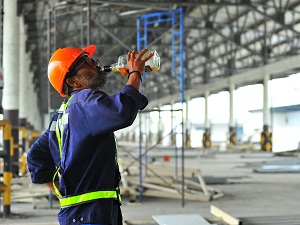Daily tasks at work may require alertness, concentration, and accurate reflexes. When these qualities are impaired due to drug or alcohol use then incidents may occur or there may be a disruption in the accuracy and efficiency of work. Substance abuse among employees can threaten public safety, impair job performance and lead to an increase in job-related injuries and incidents.

Drug and alcohol use that may affect job attendance and performance can include:
- drug use or alcohol consumption before the work shift or during the work day
- prescription drug abuse, excessive alcohol consumption or illegal drug use during non-work hours that cause side effects that last into the work day
Alcohol consumption, illicit drug use, or prescription drug misuse can vary from occasional and recreational to frequent, dependent or problematic. As a result, there are also a variety of impacts and consequences that may occur in one's personal life and at work.
Worker productivity can be affected by excessive alcohol consumption or drug use as it may lead to more frequent absenteeism, job turnover and presenteeism. Presenteeism is when the employee is physically present but not mentally engaged in the work required.
Workers who are skipping work due to substance dependency are more likely to experience workplace conflict with supervisors or peers. Such conflict may damage morale and create an uncomfortable work environment for other employees.
Employees who suffer from drug or alcohol dependency are nearly three times more likely to either cause or personally experience an injury-related absence from work.

Alcohol is a sedative that can impair a person’s judgement, thinking ability, and coordination to some degree. Employees under the influence of alcohol may experience poor concentration, carelessness, errors in judgement or may engage in unnecessary risk-taking behavior.
A range of medications can affect work performance, particularly when mixed with alcohol. These include pain relievers, cough medicine, antihistamines and sleeping pills.
Even if an employee is not consuming alcohol during work hours, hangovers from drinking can still negatively affect work performance.
Drug and alcohol use also impacts close friends and family members. Those who live with or care for a person who abuses drugs or alcohol may have a difficult time concentrating at work, need to take more days off than usual, or have health-related issues due to stress.

Problems that may occur at work because of drug or alcohol use:
- exhaustion, drowsiness, sleeping on the job
- tardiness, absenteeism
- poor decision making, difficulty problem-solving
- trouble with retaining new information
- difficulty concentrating or staying alert
- altered sense of time
- impaired coordination, slow reaction time
- memory problems, forgetfulness
- confrontational or risk-taking behavior
- reduced productivity
- illness
- loss of interest
- sensitive emotional state that affects job performance
Drugs that act as stimulants can also produce negative side effects that may cause issues at work like:
- hyperactivity
- tension, anxiety
- rapid heartbeat
- inability to focus or concentrate
- depressant effects after the initial high

As a worker, you have the responsibility to
- know where to find and understand the organization’s drug and alcohol use policy.
- understand the negative consequences that may affect employment if an employee is found to be under the influence of drugs or alcohol.
- set a good example for others.
- seek help if you or your co-worker(s) need it.
- notify management if you observe use of or impairment from drugs or alcohol that could threaten the health and safety of employees.
- acknowledge and understand that impairment of any kind is unsafe.

.jpeg)

.jpg)